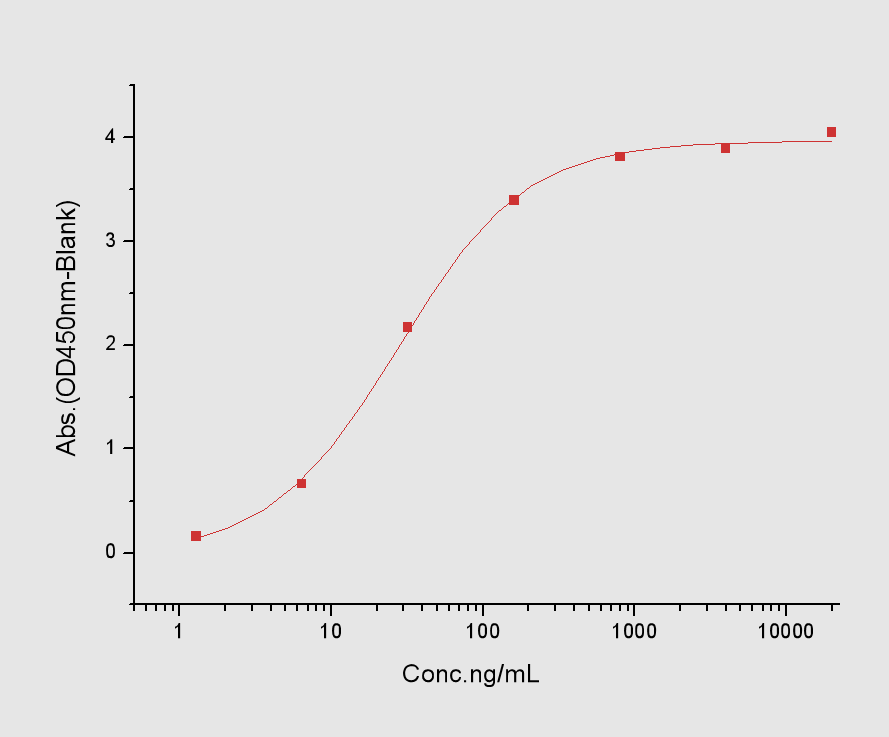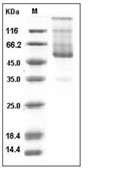Shopping Cart
Remove All Your shopping cart is currently empty
Your shopping cart is currently empty
CD70 Protein, Human, Recombinant (hFc) is expressed in HEK293 mammalian cells with hFc tag. The predicted molecular weight is 45.5 kDa and the accession number is A0A0U5JA32.

| Pack Size | Price | USA Warehouse | Global Warehouse | Quantity |
|---|---|---|---|---|
| 5 μg | $39 | 7-10 days | 7-10 days | |
| 10 μg | $59 | 7-10 days | 7-10 days | |
| 20 μg | $93 | 7-10 days | 7-10 days | |
| 50 μg | $178 | 7-10 days | 7-10 days | |
| 100 μg | $296 | - | In Stock | |
| 200 μg | $523 | 7-10 days | 7-10 days | |
| 500 μg | $1,110 | 7-10 days | 7-10 days |
| Biological Activity | Measured by its binding ability in a functional ELISA. Immobilized Human CD27 His at 2 μg/ml (100 μl/well) can bind Human CD70 hFc , the EC50 of Human CD70 hFc is 15-60 ng/mL.  |
| Description | CD70 Protein, Human, Recombinant (hFc) is expressed in HEK293 mammalian cells with hFc tag. The predicted molecular weight is 45.5 kDa and the accession number is A0A0U5JA32. |
| Species | Human |
| Expression System | HEK293 Cells |
| Tag | N-hFc |
| Accession Number | P32970-1 |
| Synonyms | TNFSF7,CD70 molecule,CD27LG,CD27L |
| Construction | A DNA sequence encoding the extracellular domain of human CD70 (NP_001243.1) (Gln 39-Pro 193) was fused with the Fc region of human IgG1 at the N-terminus via a polypeptide linker. Predicted N terminal: Glu 20 |
| Protein Purity | > 90 % as determined by SDS-PAGE  |
| Molecular Weight | 45.5 kDa (predicted); 55-60, 110-120 and 160-170 kDa (reducing condition, due to glycosylation) |
| Endotoxin | < 1.0 EU/μg of the protein as determined by the LAL method. |
| Formulation | Lyophilized from a solution filtered through a 0.22 μm filter, containing PBS, pH 7.4. Typically, a mixture containing 5% to 8% trehalose, mannitol, and 0.01% Tween 80 is incorporated as a protective agent before lyophilization. |
| Reconstitution | Reconstituted with sterile deionized water to 0.25 mg/mL. Reconstitution conditions may vary depending on the lot. |
| Stability & Storage | It is recommended to store recombinant proteins at -20°C to -80°C for future use. Lyophilized powders can be stably stored for over 12 months, while liquid products can be stored for 6-12 months at -80°C. For reconstituted protein solutions, the solution can be stored at -20°C to -80°C for at least 3 months. Please avoid multiple freeze-thaw cycles and store products in aliquots. |
| Shipping | In general, lyophilized powders are shipped with blue ice, while solutions are shipped with dry ice. |
| Research Background | CD70, a member of the tumor necrosis factor superfamily, is restricted to activated T-and B-lymphocytes and mature dendritic cells. Binding of CD70 to its receptor, CD27, is important in priming, effector functions, differentiation and memory formation of T-cells as well as plasma and memory B-cell generation. Tight control of CD70 expression is required to prevent lethal immunodeficiency. By selective transcription, CD70 is largely confined to activated lymphocytes and dendritic cells (DC). As a type II transmembrane receptor, CD70 is normally expressed on a subset of B, T and NK cells, where it plays a costimulatory role in immune cell activation. Immunohistochemical analysis of CD70 expression in multiple carcinoma types. The restricted expression pattern of CD70 in normal tissues and its widespread expression in various malignancies makes it an attractive target for antibody-based therapeutics. Investigations to exploit CD70 as a cancer target have lead to the identification of potential antibody-based clinical candidates.Cancer ImmunotherapyCo-stimulatory Immune Checkpoint TargetsImmune CheckpointImmune Checkpoint ProteinsImmune Checkpoint TargetsImmunotherapyTargeted Therapy |
| Size | Quantity | Unit Price | Amount | Operation |
|---|

Copyright © 2015-2026 TargetMol Chemicals Inc. All Rights Reserved.